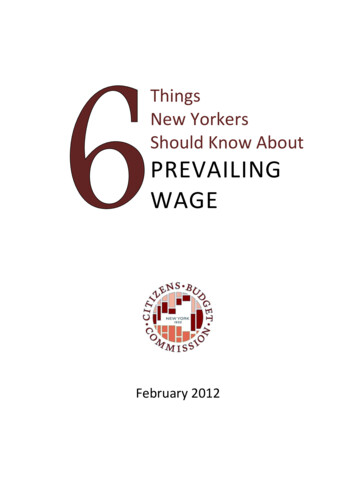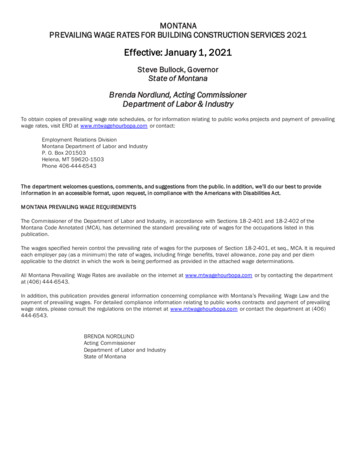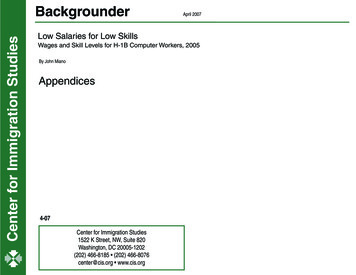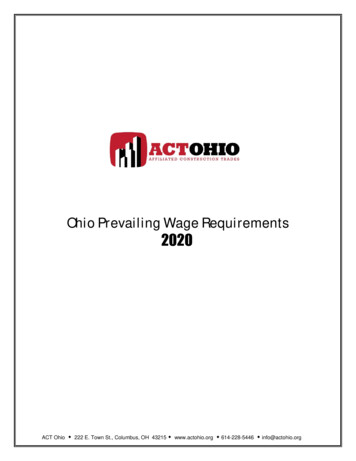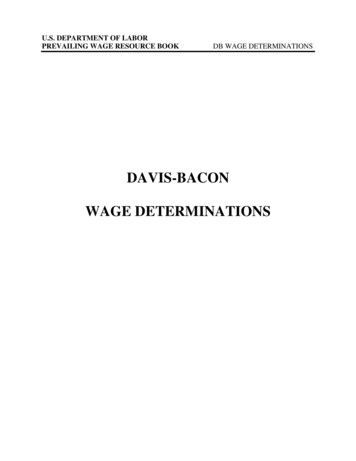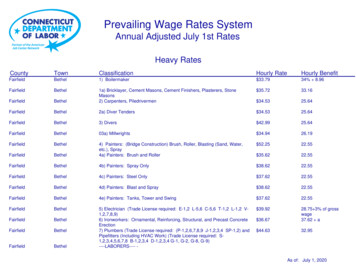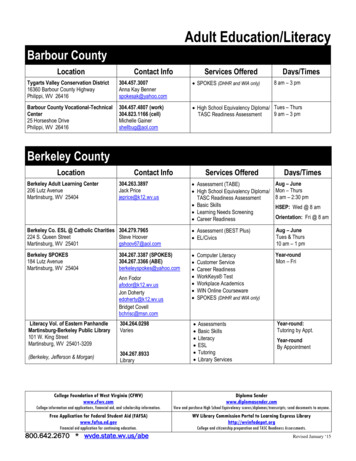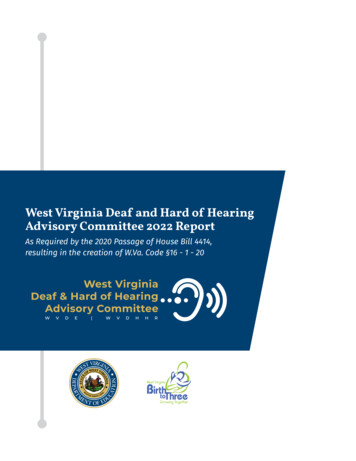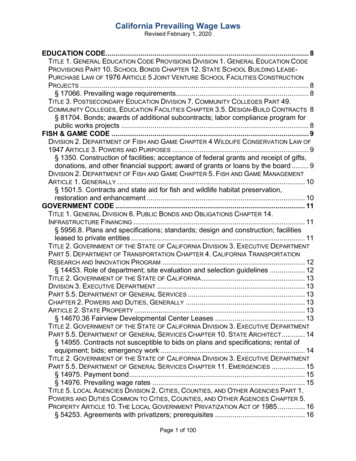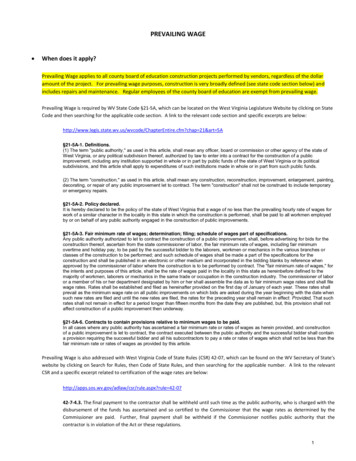
Transcription
PREVAILING WAGE When does it apply?Prevailing Wage applies to all county board of education construction projects performed by vendors, regardless of the dollaramount of the project. For prevailing wage purposes, construction is very broadly defined (see state code section below) andincludes repairs and maintenance. Regular employees of the county board of education are exempt from prevailing wage.Prevailing Wage is required by WV State Code §21-5A, which can be located on the West Virginia Legislature Website by clicking on StateCode and then searching for the applicable code section. A link to the relevant code section and specific excerpts are ntire.cfm?chap 21&art 5A§21-5A-1. Definitions.(1) The term "public authority," as used in this article, shall mean any officer, board or commission or other agency of the state ofWest Virginia, or any political subdivision thereof, authorized by law to enter into a contract for the construction of a publicimprovement, including any institution supported in whole or in part by public funds of the state of West Virginia or its politicalsubdivisions, and this article shall apply to expenditures of such institutions made in whole or in part from such public funds.(2) The term "construction," as used in this article, shall mean any construction, reconstruction, improvement, enlargement, painting,decorating, or repair of any public improvement let to contract. The term "construction" shall not be construed to include temporaryor emergency repairs.§21-5A-2. Policy declared.It is hereby declared to be the policy of the state of West Virginia that a wage of no less than the prevailing hourly rate of wages forwork of a similar character in the locality in this state in which the construction is performed, shall be paid to all workmen employedby or on behalf of any public authority engaged in the construction of public improvements.§21-5A-3. Fair minimum rate of wages; determination; filing; schedule of wages part of specifications.Any public authority authorized to let to contract the construction of a public improvement, shall, before advertising for bids for theconstruction thereof, ascertain from the state commissioner of labor, the fair minimum rate of wages, including fair minimumovertime and holiday pay, to be paid by the successful bidder to the laborers, workmen or mechanics in the various branches orclasses of the construction to be performed; and such schedule of wages shall be made a part of the specifications for theconstruction and shall be published in an electronic or other medium and incorporated in the bidding blanks by reference whenapproved by the commissioner of labor where the construction is to be performed by contract. The "fair minimum rate of wages," forthe intents and purposes of this article, shall be the rate of wages paid in the locality in this state as hereinbefore defined to themajority of workmen, laborers or mechanics in the same trade or occupation in the construction industry. The commissioner of laboror a member of his or her department designated by him or her shall assemble the data as to fair minimum wage rates and shall filewage rates. Rates shall be established and filed as hereinafter provided on the first day of January of each year. These rates shallprevail as the minimum wage rate on all public improvements on which bids are asked during the year beginning with the date whensuch new rates are filed and until the new rates are filed, the rates for the preceding year shall remain in effect: Provided, That suchrates shall not remain in effect for a period longer than fifteen months from the date they are published, but, this provision shall notaffect construction of a public improvement then underway.§21-5A-6. Contracts to contain provisions relative to minimum wages to be paid.In all cases where any public authority has ascertained a fair minimum rate or rates of wages as herein provided, and constructionof a public improvement is let to contract, the contract executed between the public authority and the successful bidder shall containa provision requiring the successful bidder and all his subcontractors to pay a rate or rates of wages which shall not be less than thefair minimum rate or rates of wages as provided by this article.Prevailing Wage is also addressed with West Virginia Code of State Rules (CSR) 42-07, which can be found on the WV Secretary of State’swebsite by clicking on Search for Rules, then Code of State Rules, and then searching for the applicable number. A link to the relevantCSR and a specific excerpt related to certification of the wage rates are ule 42-0742-7-4.3. The final payment to the contractor shall be withheld until such time as the public authority, who is charged with thedisbursement of the funds has ascertained and so certified to the Commissioner that the wage rates as determined by theCommissioner are paid. Further, final payment shall be withheld if the Commissioner notifies public authority that thecontractor is in violation of the Act or these regulations.1
Where do you go to compare it to?Each year, the Wage & Hour section of the West Virginia Division of Labor establishes the “Prevailing Hourly Rate” of wages ineach of the classification of work for building, highway and heavy construction projects. The prevailing rate for each locality isdetermined by the Labor Commissioner on an annual basis. Information is solicited from public authorities and contractors; bothunion and non-union alike. Once received, the data is analyzed and the rates for all 55 counties in West Virginia are determinedseparately.Below is a link from the WV Division of Labor website to the 2011 Prevailing Wage erates/Pages/2011BuildingConstruction.aspx What does the contractor need to supply for proof?WV State Code §42-7-7 states the following: “The contractor and each subcontractor or the officer of the public authority incharge of the construction of a public improvement shall keep an accurate record. “ It goes on to state that all records must bemaintained for a period of no less than 3 years. While there is no mandatory format, state code outlines the specific informationthat must be included in the payroll records. A copy of applicable state code is attached.According to the FAQ on the WV Division of Labor website, the submission of weekly certified payrolls is normally required by thefederal government (for projects under their jurisdiction), the public authority or the general contractor for the duration of theproject. While the WV Division of Labor does not require the routine submission of certified payrolls to their office, they dorequest them as part of a prevailing wage investigation.Per Larry Walker, Director of Wage and Hour Section of the WV Division of Labor, the contractors and subcontractors must do thepayroll certifications weekly. Certifications cannot be performed bi-weekly, even though the contractor or subcontractor ispermitted to actually pay the employees on a bi-weekly basis.A payroll certification form (a copy is attached) can be located on the WV Division of Labor website eforms/payroll.pdf Due DiligencePublic authorities are required to exercise proper due diligence pertaining to the payment of prevailing wage by contractors,particularly since the public authority will be held ultimately responsible if prevailing wage is not being paid properly. Per LarryWalker, the WV Division of Labor first seeks payment from the contractor in the event of a violation, but there are a few instanceseach year where circumstances force them to seek payment from the public authority.It is up to each county board of education as to the level of due diligence necessary to determine that prevailing wage is beingpaid properly on their construction project. Factors impacting that level could include the dollar amount of the project,experience with the vendor, complexity of the project, use of subcontractors on the project, etc.Examples of performing due diligence include: Detail review of the certified payroll forms – recalculate amounts, check all dates listed, look for obvious errors, etc.Compare a sample of individuals on the certified payroll form back to source documents from the vendor’s payrollsystem (timesheets, work orders, etc.)2
Visit the job site and perform employee interviews. Make sure that the employees interviewed are listed on the payrollform. Make sure that the job classification listed matches the work that was being performed by the employee on theday you visited the job site.If you are unable to actually visit the job site (the preferred method), perform employee telephone interviews.Look at the natural progress of the project and make sure that the appropriate job classifications are showing up on thecertified payrolls. For example, if the roof was just added to your new school, you would expect to see the“Roofer\Heated Coal Tar Product” or “Roofer\Water Damp Proofer” classifications on the next certified payroll youreceive from the vendor.Additional Prevailing Wage InformationAttached is a copy of the FAQ from the WV Division of Labor website. It contains very useful information about prevailing wagerates, how they should be paid, whether overtime applies, how it applies to salaried employees, etc.The WV Division of Labor is willing to assist with determination as to whether prevailing wage applies to a particular project. Acopy of the form to submit is attached. This form can be found on the WV Division of Labor website 0DeterminationPDF.pdfThe WV Division of Labor is also willing to assist with determining the proper wage classification for a particular employee. A copyof the form to submit is attached. This form can be found on the WV Division of Labor website ation%20Review%20Request.pdfThe WV Division of Labor is willing to take over the investigation if a county board of education identifies a prevailing wageviolation. Simply contact the Wage and Hour Section and notify them of your findings.3
WV Division of Labor Prevailing Wage FAQ
“PIGGYBACKING” EXPLAINEDSection 8.1.4 of Policy 8200, Purchasing Procedures for Local Educational Agencies, allows County Boards of Education to purchaseequipment and other commodities or services directly from a vendor without competitive bidding if the item is available from a statewidecontract and “piggybacking” by local governmental entities is permitted in the contract.What is “piggybacking”?Piggybacking is defined as the utilization of an existing open-end contract (in this case a statewide contract) to which therequesting agency was not an original party.What is a statewide contract?A statewide contract is a legal and binding instrument between the state and a vendor which is used by state agencies and somepolitical subdivisions, such as municipalities, counties, boards of education, to purchase frequently used commodities andservices. These contracts are generally issued by the WV Purchasing Division based on the theory that they apply to multiple stateagencies.Do other state agency contracts allowing “piggybacking”?Contracts entered into by other state agencies besides the WV Purchasing Division, such as the Department of Education or theDepartment of Health and Human Resources, may contain provisions that allow for use by other state agencies, politicalsubdivisions, etc. but the contracts are not required to contain such provisions. When these contracts, referred to as agency-widecontracts, do contain such provisions, other state agencies and political subdivisions may utilize them. Two examples of widelyused agency-wide contracts are Tools for Schools – Elementary and Tools for Schools – Secondary.Can a county use a contract from a state agency that allows “piggybacking”?While Policy 8200 does not specifically address the use of such contracts by counties, it is the Office of School Financeinterpretation that use of such contracts is allowable. The WV Purchasing Division reviews such contracts and can even determinethat use of such a contract is mandatory for other state agencies, essentially making them a statewide contract. Allowing the useof such contracts is in accordance with the intent of Section 8.1 of Policy 8200.Where can you find statewide and other state contracts that allow “piggybacking”?The WV Purchasing Division maintains a list of all statewide and other state agency contracts that allow “piggybacking” on theirwebsite at the following racts.htmlThe above site contains a button for statewide contracts and one for “piggybacking” contracts.4
RECOMMENDED PROCEDURES FOR WVEIS VENDOR ADDITIONThe following recommendations have been designed to assist in adding a vendor to WVEIS: Vendor records are created for valid vendors doing business with the county boards of education. Each vendor record isassigned a unique vendor number. Each new vendor should complete an IRS Form W‐9. This form primarily contains the name of the vendor or entity, their taxidentification number, and their business designation code. For foreign vendors, a series of IRS Forms W‐8 are required.These forms should be kept on hand to validate the information for a vendor or entity if questions arise from the InternalRevenue Service as a result of an inquiry or audit. To ensure that all information for the new vendor is correct, please makecertain that all information has been completed by the vendor and is an original document. Counties may want to obtain acopy of a business license and/or any additional information that they find helpful. Prior to adding a vendor into WVEIS, there should be an inquiry to see if the vendor already exists in the vendor file. Thevendor search should be made using both the FEIN/SSN and vendor name. Also, please be sure to check for all possiblespelling and/or abbreviations. Once it is determined that the vendor is not a duplicate in the system, please enter allnecessary information from the W‐9 form into WVEIS. Proper internal controls along with segregation of duties will reduce the exposure of fraud. Ideally, the person who entersthe new vendors should not have access to any other functions in the accounts payable process. However at a minimum,the person who enters the new vendor should not also have the ability to approve invoices. If the vendor information needs to be modified, including the address, please obtain a new revised IRSForm W‐9 from the vendor before making changes to WVEIS. A vendor that becomes inactive may be placed on hold on the vendor screen. By placing them on hold, purchase orders andpayments cannot be made to that vendor. Add a comment detailing the reason why that vendor was deactivated. Obtain anew W‐9 prior to reactivating a vendor. Instances where further vendor verification may be needed:1. Vendors whose invoices do not have pre‐printed sequential invoice numbers2. Vendors with PO Box addresses3. Any new vendor over a certain dollar amount (for example: 25,000)4. Unusual looking invoices5. Any invoice without a phone number6. Any vendor where the W‐9 information does not match the business registration information Maintenance items:1. Review the master vendor file yearly. Deactivate (not delete) any vendors that have not been used within the last 12‐15months.2. Annually send out new W‐9 forms to a sample of vendors to ensure information has not changed.5
AUDIT CERTIFICATE REQUIREMENT FOR RELEASE OF FINAL PAYMENT TO CONTRACTORSStatutes require the state (and agencies of the state) and local governments obtain assurance that the vendors in which they enter intocontracts with are not delinquent for workers compensation or unemployment compensation amounts due. Final settlement of thecontract cannot be made until this certificate or assurance is obtained.The agency that provides verification for Workers Compensation is the “Employer Coverage” division of the West Virginia InsuranceCommissioner. The agency that provides verification for Unemployment is “Workforce West Virginia” a division of the Department ofCommerce.State agencies obtain this assurance through the FIMS system which indicates whether a particular vendor is considered delinquent byeither of these agencies. Local governments must utilize other verification methods.Direct confirmation may be attained at each agency’s web site. The relevant statutes and agency contact information follows:WORKERS COMPENSATION§23-1-1c. Payment withholding; interception; penalty.(a) All state, county, district and municipal officers and agents making contracts on behalf of the State of West Virginia or any politicalsubdivision thereof shall withhold payment in the final settlement of contracts until the receipt of a certificate from the commission or thecompany created in article two-c of this chapter to the effect that all payments, interest and penalties thereon accrued against thecontractor under this chapter as of the termination of the commission have been paid or that provisions satisfactory to the commission orcompany created in article two-c of this chapter have been made for payment. Any official violating this subsection is guilty of amisdemeanor and, on conviction thereof, shall be fined not more than one thousand dollars or confined in the county or regional jail fornot more than one year, or both fined and confined.(b) Any agency of the state, for the limited purpose of intercepting, pursuant to section five-a, article two of this chapter, any payment byor through the state to an employer who is in default in payment of contributions, premiums, deposits, interest or penalties under theprovisions of this chapter, shall assist the commission or company created in article two-c of this chapter in collecting the payment that isdue under subsection (a) of this section. For this purpose, disclosure of joint delinquency and default lists of employers with respect tounemployment compensation as provided in section six-c, article one, chapter twenty-one-a of this code and Workers' Compensationcontributions, premiums, interest, deposits or penalties is authorized. The commission and the bureau of employment programs may enterinto an interagency agreement to effect the provisions of this section. The lists may be in the form of a computerized database to beaccessed by the auditor, the Department of Tax and Revenue, the Department of Administration, the Division of Highways or otherappropriate state agency or officer.Contact person: Karen McClureGo to www.wvinsurance.gov-workers compensationcoverage validationviolators systemdefaulted employerPhysical mailing address:Office of the Insurance CommissionerP.O. Box 11682Charleston, WV 25339Attn. Employer CoverageKaren McClurePhone number: 304-558-6279 ext 5023Fax number:304-558-55866
Email: karen.mcclure@wvinsurance.govcc deborah.tincher@wvinsurance.govUNEMPLOYMENT COMPENSATION§21A-2-6c. Payment withholding and interception.(a) All state, county, district and municipal officers and agents making contracts on behalf of the state of West Virginia or any politicalsubdivision thereof shall withhold payment in the final settlement of contracts until the receipt of a certificate from the commissioner tothe effect that all payments, interest and penalties thereon accrued against the contractor under this chapter have been paid or thatprovisions satisfactory to the commissioner have been made for payment. Any official violating this subsection is guilty of a misdemeanorand, on conviction thereof, shall be fined not more than one thousand dollars or confined in a county or regional jail for not more than oneyear, or both fined and confined.(b) Any agency of the state, for the limited purpose of intercepting, pursuant to section sixteen, article five of this chapter and pursuant tosection five-a, article two, chapter twenty-three of this code, any payment by or through the state to an employer who is in default inpayment of contributions, premiums, deposits, interest or penalties under the provisions of this chapter or of chapter twenty-three of thiscode, shall assist the commissioner in collecting the payment that is due. For this purpose, disclosure of joint delinquency and default listsof employers with respect to unemployment compensation and workers' compensation as provided in section one-c, article one, chaptertwenty-three of this code contributions, premiums, interest, deposits or penalties is authorized. The bureau and the workers'compensation commission may enter into an interagency agreement to effect the provisions of this section. The lists may be in the form ofa computerized database to be accessed by the auditor, the department of tax and revenue, the department of administration, thedivision of highways or any other appropriate state agency or officer.Contact person: Cathy CorleyGo to www.wv.gov-WV AgenciesWork Force West VirginiaUnemploymentEmployerDefaulted Accountso Go to log in to get representative who will give a password to log in and use this password for future referencePhysical mailing address:Work Force West VirginiaUC Audit and Compliance112 California AvenueCharleston, WV 25305Phone number: 304-558-2451Fax number: 304-558-6532Email: ucworkforcecae@wv.gov7
MISCELLANEOUS PURCHASING QUESTIONSAre you required to bid annually for services like pest control?No, counties are not required to bid annually for services like pest control. Counties are permitted to have contracts for a period ofup to 12 months that contain up to two successive one year renewal periods (a maximum of three years if both renewals areexercised). This is allowed under Section 3.2.5 of the Purchasing Policies and Procedures Manual (State Board Policy 8200), whichcontains the following provisions:3.2.5.b Life of Contract - Contracts normally cover a 12-month period or cite a specific time for completion for the projector service. A solicitation for a contract that includes an option on the part of the LEA to extend or renew the contract for anadditional period may be advantageous and may be considered. If price adjustments are permitted during the contractperiod, the conditions under which they are authorized must be specified in the original solicitation and resulting contract.All contracts should be reviewed during the contract period to determine if the need still exists for the commodities orservices, if prices are fair and reasonable based on the current market conditions, and if performance is satisfactory.3.2.5.c Renewals - The standard terms and conditions used to indicate a specified date on which the contract becomeseffective, and extends for a period of one year or until such "reasonable time" thereafter as is necessary to obtain a newcontract or renew the original contract. The "reasonable time" period shall not exceed twelve months. Unless specificprovisions are stipulated in the contract document, the terms, conditions and pricing established are firm for the life of thecontract.Contracts that contain renewal provisions may be renewed upon the mutual written consent of the LEA and vendor prior tothe expiration date. A letter of justification should be maintained on file, stating pertinent reasons for the recommendationto renew an existing contract. These factors include, but are not limited to, vendor performance, market conditions andother analytical measures that indicate that renewing the contract is in the best interest of the LEA. Renewals shall be inaccordance with the terms and conditions of the original contract and are limited to two successive one year periods.Please note that the decision to exercise a renewal option must be supported by a letter of justification that should be maintainedon file.Also, there is a piggybacking contract available for pest services which a county may find to be in its best gyback/PEST.htmAre you required to bid annually for workers compensation?No, applying the provisions of Section 3.2.5 of the Purchasing and Procedures Manual (State Board Policy 8200), counties are not required to bidannually for services like workers compensation. Counties are permitted to have a contract covering a period of up to 12 months that contains twosuccessive one-year renewal periods (for a total of three years assuming both renewals are exercised).Please keep in mind that Section 19.2.2 allows for the establishment of locally developed criteria for evaluating and negotiating such services. Thecontract does not necessarily have to be awarded to the lowest bidder. Section 7.10 requires that counties document the criteria and selectionprocess and retain such documentation in accordance with the document retention schedule.In addition, counties are required to have an agent of record (whose services are not required to be bid). This agent of record may, but does nothave to be, the actual insurance provider as well. The agent of record is permitted to solicit bids on behalf of the board from multiple insuranceproviders in order to meet the competitive bid requirements.Once you bid an item, how long does the bid stand for?Unless otherwise specified on the bid, it is assumed that the bid is only good for the particular procurement for which it was requested. However,when requesting a quote, proposal, etc, the county has the option of specifying a period for which they want the bid to be valid (ex: 60 days, 90days, 120 days, etc.). Vendors should include a statement specifying the requested validity period on their response to show that they are inagreement with the extended period.8
Can county boards purchase food for staff?No, county boards may not purchase food for staff. There is no statutory authority allowing such a purchase. Food may only be purchased forstudents and parents.Section 9.1 of the Purchasing Procedures Manual (State Board Policy 8200) is misleading, as it was taken from state purchasing regulations but, inerror, was not modified to apply to county boards. Section 9.1.7 indicates that facilities rentals (including food, beverages, entertainment andother expenses related to conducting a meeting) are exempt from competitive bid requirements. While facilities rental itself would be exempt forcounty boards, the reference to food and beverages does not apply.In addition, although food for meetings is listed as an allowable cost under OMB Circular A-87, the lack of a statutory authority allowing foodpurchases for staff by county boards would take precedence.Can county boards provide uniforms and other safety equipment for staff?Yes, county boards are permitted to provide uniforms and safety equipment for SERVICE PERSONNEL only. County boards are also permitted toprovide cleaning of such items. It is not a requirement to provide these items.If a county does provide these items for service personnel, the county must comply with any IRS regulations. Uniforms may qualify as a WorkingCondition Benefit that is not taxable to the employee. IRS Publication 15-B defines Working Condition Benefit as “property and services youprovide to an employee so that the employee can perform his or her job.” The Publication further states that the tax exemption applies “to theextent the employee could deduct the cost of the property or services as a business expense or depreciation expense if he or she had paid for it.”IRS Publication 529 considers the following to be an unreimbursed employee expense: “work clothes and uniforms if required and not suitable foreveryday use.”Based on the content of these publications, if a county requires that the employee wear the uniform provided, it would not be taxable to theemployee. However, if the uniforms are optional for the employees, the cost of the uniforms would a taxable event because the employee couldnot claim the expense as an unreimbursed employee expense.Links to the applicable sections of these IRS publications are ml#en US 2011 529/ar02.html#en US publink100027002Can county boards reimburse employees for expenses other than travel?In order to reimburse employees for expenses other than travel, a county board must follow all other purchasing requirements, including having apurchase order in advance of the purchase by the employee. Substantiation of the expense is required by the employee through invoices, etc.Counties are not allowed to reimburse employees for sales tax. The only exception to this pertains to the first 100 (recently increased from 50)of faculty senate funds allotted to a teacher. If a faculty senate votes to allow the teacher to spend faculty senate funds in excess of 100, countiesare not permitted to reimburse for sales tax on purchases beyond the first 100.9
AGREEMENT ADDENDUM FOR CONTRACTSSection 12.4 of the Purchasing Policies and Procedures Manual (State Board Policy 8200) contains the followingprovision:12.4“If using an agreement provided by the vendor, care must be exercised to ensure that the agreement doesnot contain contractual requirements that are in violation of state statutes, such as any clause that requiresa prepayment, the imposition of a penalty or termination charge should the LEA cancel the agreement, orthe requirement that the LEA indemnify or hold harmless the vendor. A sample of an agreement addendumis included in Appendix C that can be attached to any agreement to modify common requirements that arenot acceptable.”The addendum included in Appendix C, which is attached for your reference, is an ada
county board of education construction projects performed by vendors, regardless of the dollar amount of the project. For prevailing wage purposes, construction is very broadly defined (see state code section below) an. d includes repairs and maintenance. Regular employees of the county board of education are exempt from prevailing wage.

